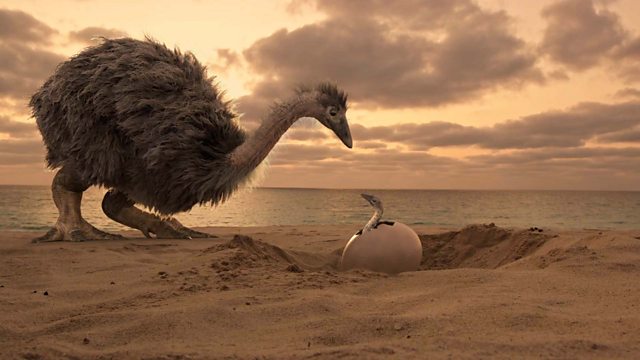Mystery of the Giant Birds/Dìomhaireachd nan Eun Mhora
Giant birds once existed all around the world, but none of these birds were able to fly. So how did they arrive in these distant lands?
Bhithear an dùil Eòin ailbhein à Madagascar agus moathan à Sealainn Nuadh a lorg ann an leabhar fantasachd ach bho chionn 70 millean bliadhna bha na eòin seo beò san t-saoghal. Bha cuideam 800cg ann an cuid aca, is feadhainn eile cha mhòr ceithir meatairean a dh’àirde. An aon rud a bha cumanta: cha b’ urrainn dhaibh sgèith. Ciamar a nochd na eòin mòra gun iteig seo ann an tìrean iomallach?
Air sgàth fosailean air an ùr-lorg agus leasachaidhean ann a bhith a’ togail DNA àrsaidh, tha luchd-saidheans air crathadh a thoirt air beachdan a bha gu seo stèidhichte gluasadan mòr-thìreil gus mìneachadh carson a bha na eòin gun iteig seo beò ann an leth dheas an t-saoghail. Ach tha rannsachadh ginteil a-nis ag ath-chruthachadh eachdraidh èabhlaideach, iongantach nam beathaichean dìomhair seo.
Elephant birds of Madagascar and moas of New Zealand sound like creatures from a fantasy book, but some 70 million years ago these birds roamed the Earth. Some weighed up to 800 kilos, others stood nearly 4m high. But they all had something in common: they were unable to fly. So how did these ground-dwelling, supersized birds arrive in these distant islands?
Thanks to recent fossil discoveries and improvements in extracting ancient DNA, scientists have thrown a spanner in the works of existing theories which, until now, used the continental drift to explain the existence of these flightless birds in the southern hemisphere. But genetic studies are now reconstructing the unexpected evolutionary history of these enigmatic animals.
Dubbed in Gaelic with English subtitles
Last on
Credits
| Role | Contributor |
|---|---|
| Narrator | Shona MacLellan |
| Executive Producer | Calum McConnell |
| Producer | Ann Morrison |
| Producer | Seumas Mactaggart |
Broadcasts
- Thu 8 Aug 2024 21:00
- Sat 10 Aug 2024 22:00
- Sat 14 Dec 2024 22:00

